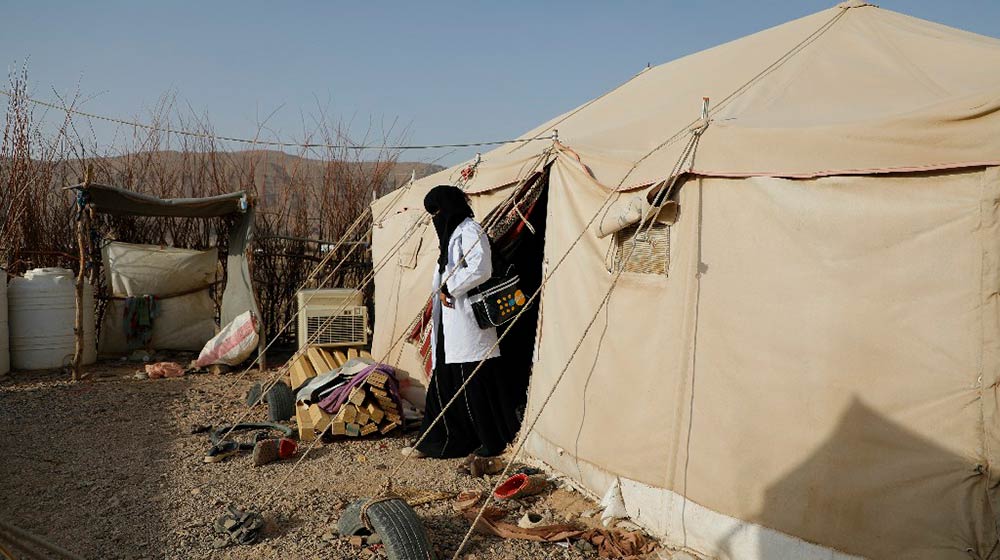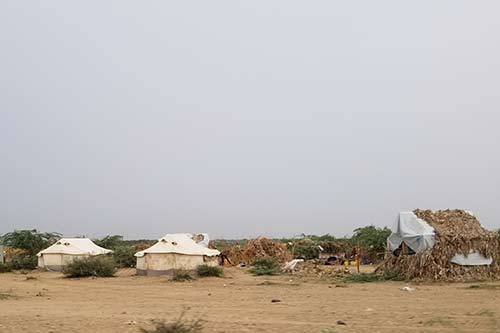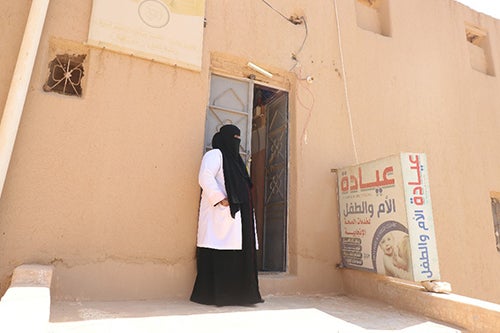Surviving COVID-19 & conflict for women in Yemen

AL HUDAYAH, Yemen – Fatima once had a very different life. In the past, she was a well-educated woman, with a diploma in clinical laboratory science, and happily married with three children.
Everything changed when Yemen’s conflict erupted. When turmoil enveloped their home district, Al Khokah, in Al Hudaydah Governorate, an explosive missile took her husband’s life. Scared for their lives, her father’s family decided to flee.
One year after her husband’s death, Fatima made the painful decision to leave, as well. “I had no one to back me up or support me to alleviate my pain and grief,” she explained. She left as the conflict and COVID-19 spread through Yemen.
Without any means of transport, she and her kids – aged 7, 12 and 15 – set out on foot, leaving nearly everything behind.

Fleeing both conflict and COVID-19
By that point, the COVID-19 pandemic had erupted and her priority was surviving COVID-19 in Yemen. Fatima feared that life in a crowded city would expose her family to the virus.
Instead, went to Tuhama, a countryside area on the outskirts of Zabid, where there was a displacement camp not far from the village where her sister lives.
They trudged for three hours in the desert heat, “under the hot blazing sun and over the burning sand,” she recalled. Finally, they arrived at a road where they flagged down a car for a ride.
Surviving COVID-19 in Yemen
Sadly, Fatima’s hope that a rural destination would protect her family from the pandemic was incorrect. Soon after arriving at the displacement camp, she fell ill with COVID-19.
She quarantined in Zabid’s hospital. There, she was in isolation, struggling for air. “I felt so lonely and dark,” she said. “I was finding it difficult with every breath I took.”
“You have to find the strength to get better,” one of the medical staff told her. “Think of people who give you strength.”
Fatima thought of her kids. They were her motivation to recover.
“I was struggling to save my life to go back to my children,” she said.
A new strength
Finally, at the end of March, Fatima recovered and left the hospital. She returned to the displacement camp and was reunited with her children.

Fatima sought out medical counseling at the Zabid Hospital, supported by UNFPA. In addition to surviving COVID-19, she was also able to receive reproductive health services in Yemen, and her son has been able to access treatment for his sickle cell anemia.
The Conflict and Women in Yemen
This year, UNFPA is supporting 105 health facilities across Yemen. More than half a million women and girls have received life-saving reproductive health services within the last six months. This care has been supported by the European Union, KSRelief, Qatar, the Republic of Korea, and the UN Central Emergency Relief Fund.
But the operating environment remains severely challenging. UNFPA, through its partners, is the sole provider of essential life-saving reproductive health medicines in Yemen. To keep reaching the most vulnerable women and girls, UNFPA requires $100 million in 2021. To date, only 30 percent of this funding appeal has been received.
As for Fatima, she has not yet been able to find work, but her family has been getting by on emergency relief distributed in the camp. She is determined to be strong. And, she is even allowing herself to imagine a better future.
“The displacement and the pandemic have changed my life,” she said. “They made me strong. I did things no one could imagine or endure. But I still dream of going back home with my kids. I hope, one day, the pandemic and war will perish from my country.”
UNFPA.org originally published a version of this story.